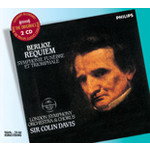
Berlioz: Requiem / Symphonie funebre et triomphale
 $45.00
Low Stock
add to cart
$45.00
Low Stock
add to cart
HECTOR BERLIOZ
Berlioz: Requiem / Symphonie funebre et triomphale
Ronald Dowd (tenor) / Wandsworth School Boys' Choir / London Symphony Orchestra & Chorus / Sir Colin Davis
[ Philips Originals / 2 CD ]
Release Date: Sunday 20 August 2006
This item is only available to us via Special Import.
"Davis's readings of imagination and vision are still highly competitive after 30 years."
Gramophone Magazine August 2001.
"Davis's readings of imagination and vision are still highly competitive after 30 years."
Gramophone Magazine August 2001
'The large-scale brass sound is formidably caught and the choral fortissimos are glorious'
The Penguin Guide
Colin Davis is recognised as today's pre-eminent interpreter of Berlioz, and this famous recording supports that.
The Requiem is not a religious work but rather a piece of ceremonial music to salute those who had fallen in the July Revolution of 1830. There's a famous "speaker-shattering" section ("Tuba mirum") when Berlioz winds up the tension before unleashing four brass bands to play from the four points of the compass to conjure up the Day of Judgement! Philips' engineers capture this magnificently.
The work contains some of the most awesome and grandiose music ever composed which Berlioz himself described as "overwhelming and horrifying grandeur".
The Te Deum is no less thrilling, with Davis inspiring his chorus to new heights on this superb recording.
For a complete list of this series type 'philips 50' into search
Fifty years on, and the mere mention of Philips Records is still enough to conjure qualities that were first acclaimed when the long-playing vinyl record was in its infancy. In those days, the Dutch Philips label was renowned for the warmth of its recordings and the supreme musicianship of its artists, many of whom went on to achieve legendary status.
Philips 50 brings the excitement of those days back to life on 50 CD re-releases, each of which is enhanced by a sophisticated audio restoration process (96kHz ‹ 24 bit technology) that extracts the maximum impact from the original tapes. And yet not everything on Philips 50 is "old". Dietrich Fischer-Dieskau's digital recording of Schubert's achingly beautiful song-cycle Winterreise with Alfred Brendel is as great a recording as any and enjoys the additional benefit of full digital sound. Valery Gergiev's rugged and spontaneous digital Kirov recording of Prokofiev's complete Romeo and Juliet ballet was widely acclaimed when it first appeared, and makes a welcome reappearance at mid-price. Then there's Mitsuko Uchida's atmospheric and immaculately sculpted reading of Debussy's 12 Etudes, classic recordings in every sense of the term, and a fine example of Philips' legendary piano sound. Zoltán Kocsis' benchmark Bartók recordings provide another.